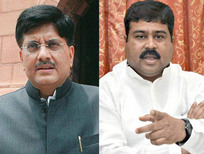
NEW DELHI: India and other major emerging economies are not IEA members but agency has "close co-operative working relationships" with them, says IEA chief Minister of Petroleum and Natural Gas Dharmendra Pradhan with MoS for Power, Coal and New & Renewable Energy Piyush Goyal, Chief Economist IEA Fatih Birol with VC of NITI Ayog Arvind Panagariya during a workshop on the India Energy Outlook in New Delhi...

The International Energy Agency (IEA) is keen that India becomes a full-time member of the Paris-based agency that advises governments of 29 developed nations. "Our arms and hearts are open to India," IEA chief economist and future head, Fatih Birol told reporters here. He was responding to a question to his fellow panelist and India's Oil Minister Dharmendra Pradhan if New Delhi was open to becoming a full-time member of the IEA. "Before becoming a member, IEA has given enough recognition to India," he said, referring to the agency's plans to bringing out India Energy Outlook report in November this year. India, as also major emerging economies like Brazil, China, Indonesia, Mexico, Russia, South Africa and Thailand are not members of the IEA but the agency has "close co-operative working relationships" with them.
IEA, which counts the U.S., Japan and Germany as members, is opening up to emerging economies for the first time since it was founded four decades back, after the first oil crisis, as a grouping of industrialised economies. With just over half of the world's energy consumption taking place outside the IEA region, the agency is courting developing nations for data sharing and more co-ordination over the release of emergency crude oil stocks held by its member countries. But new associated countries are not obliged to hold the equivalent of 90 days of crude oil imports that industrialised countries maintain as emergency reserves.
As full member, India will have to meet eligibility criteria, including maintaining emergency oil reserves equivalent to at least 90 days of net imports. New Delhi is building strategic storages to meet crude oil demand for 11-12 days and if the storages at the refineries and depots are counted, it has about 74 days of additional stocks.
Pradhan said India has its aspirational needs and they will be weighed before a decision is made. Earlier speaking at a workshop on the India Energy Outlook, Birol said, "India is in the middle of profound transformation that will take it to the centre stage of the world energy market." India is the third-largest energy consumer after China and the U.S. "Its energy use will continue to increase but rate of growth and how to fund it are far from certain."
The nation of 125 crore people needs "$100 billion each year" to fund growing energy needs, he said. Two-third of this investment will be needed in putting up new capacities in the power sector as well as transmission lines and distribution grids. The remaining would be for oil and gas fields and associated infrastructure, he added.
IEA, which counts the U.S., Japan and Germany as members, is opening up to emerging economies for the first time since it was founded four decades back, after the first oil crisis, as a grouping of industrialised economies. With just over half of the world's energy consumption taking place outside the IEA region, the agency is courting developing nations for data sharing and more co-ordination over the release of emergency crude oil stocks held by its member countries. But new associated countries are not obliged to hold the equivalent of 90 days of crude oil imports that industrialised countries maintain as emergency reserves.
As full member, India will have to meet eligibility criteria, including maintaining emergency oil reserves equivalent to at least 90 days of net imports. New Delhi is building strategic storages to meet crude oil demand for 11-12 days and if the storages at the refineries and depots are counted, it has about 74 days of additional stocks.
Pradhan said India has its aspirational needs and they will be weighed before a decision is made. Earlier speaking at a workshop on the India Energy Outlook, Birol said, "India is in the middle of profound transformation that will take it to the centre stage of the world energy market." India is the third-largest energy consumer after China and the U.S. "Its energy use will continue to increase but rate of growth and how to fund it are far from certain."
The nation of 125 crore people needs "$100 billion each year" to fund growing energy needs, he said. Two-third of this investment will be needed in putting up new capacities in the power sector as well as transmission lines and distribution grids. The remaining would be for oil and gas fields and associated infrastructure, he added.

 RSS Feed
RSS Feed
